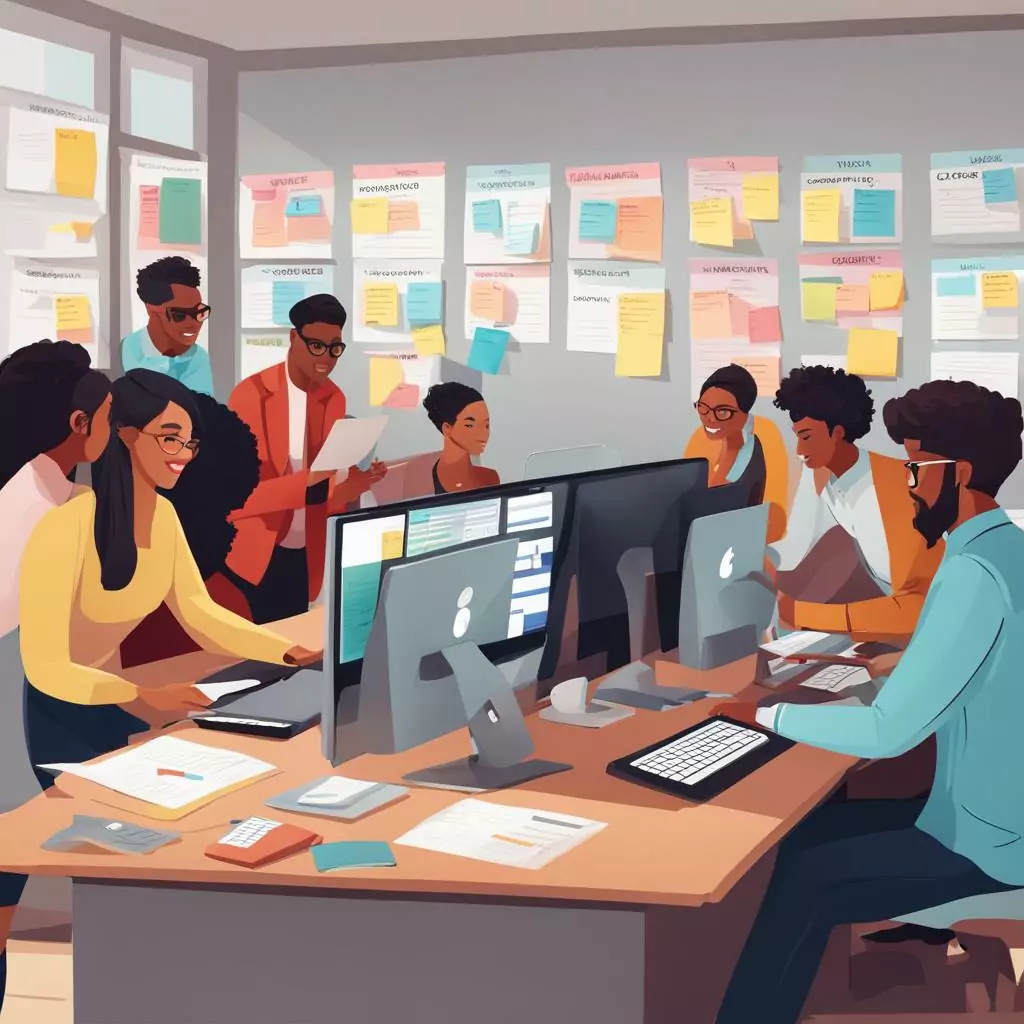Did you know that the tech skills have become essential to stand out in the current job market and prepare for the demands of future? According to the report “The Future of Work 2023″ of the World Economic Forum, sustainability skills, technology and digital transformation, artificial intelligence, data analysis, information security, agile mindset and adaptation, and technological competence will be highly valued in the coming years.
In the face of this technological revolution, investing in the development of these skills is essential to remain relevant in the constantly evolving job market. In the next topics, we will explore the tech skills essential for the future and how you can prepare to face the challenges that lie ahead.
Main points to note:
- To the tech skills are essential to stand out in the current job market and prepare for the future;
- The report “The Future of Work 2023″ highlights skills in sustainability, technology and digital transformation, artificial intelligence, data analysis, information security, agile mindset and adaptation, and technological competence;
- Investing in the development of these skills is crucial to face the demands future of the job market;
- Prepare for the challenges of the future by acquiring knowledge and experience in these areas;
- O continuous learning and openness to change will be essential to adapt to new demands of the job market.
Emotional intelligence
A emotional intelligence It’s a critical skill in today’s workplace. Understanding and controlling your own and others' emotions is valuable for leadership and teamwork. Develop the emotional intelligence provides a emotional understanding deeper and interpersonal skills improved, resulting in healthier and more effective relationships in the professional environment.
A leader with emotional intelligence is able to identify emotions both in themselves and in others, which facilitates communication and conflict resolution. Furthermore, the ability to deal with pressure and stress in a balanced way is a differentiator in management positions. leadership.
“Emotional intelligence allows us to be aware of our own emotions, understand the emotions of others, and use this knowledge to guide our actions and relationships at work.” – Daniel Goleman
To develop emotional intelligence, you need a continuous learning and constant self-reflection. Below are some tips for improving emotional skills:
- Practice emotional self-management: identify your emotions and learn to control them in a positive way
- Develop empathy: try to understand other people’s emotions and put yourself in their shoes
- Strengthen communication skills: listen carefully and express yourself clearly and respectfully
- Foster healthy relationships: Build and maintain positive interpersonal connections
- Practice emotional resilience: face challenges with an open and adaptable mindset
Continuous Learning in Emotional Intelligence
O continuous learning plays a crucial role in the development of emotional intelligence. When seeking knowledge and skills related to emotional understanding, it is possible to expand your ability to deal with your own emotions and those of others.
An effective way to learn about emotional intelligence is through books, online courses and specific workshops. These resources provide theoretical and practical knowledge, as well as strategies for applying emotional intelligence in the workplace.
To aid in the ongoing learning of emotional intelligence, below is an example from a highly recommended book:
See too:
| Book | Author | Description |
|---|---|---|
| “Emotional Intelligence: The Revolutionary Theory That Defines What It Means to Be Intelligent” | Daniel Goleman | This acclaimed book explores the principles of emotional intelligence and how to apply them to improve personal and professional relationships. With practical insights and compelling examples, the author provides a comprehensive perspective on the importance of emotional intelligence in the world of work. |
Developing emotional intelligence is an ongoing but rewarding journey. By investing in improving these skills, it is possible to obtain significant benefits in the workplace, from an increase in productivity and leadership effective until the creation of more harmonious and collaborative interpersonal relationships.

Continuous Learning
The technological world is constantly evolving and, to keep up with this fast pace, continuous learning is essential. It is important to constantly seek opportunities to update and develop knowledge to remain relevant in the job market. One of the most accessible and flexible forms of continuous learning is online courses.
You online courses offer a wide range of learning options, ranging from specific technical skills to interpersonal skills fundamental. They allow you to study at your own pace, adapting learning to your routine and personal interests.
Advantages of Online Courses
Flexibility: Online courses offer unparalleled flexibility, allowing you to adjust your study time according to your availability. You can attend classes whenever and wherever you want, using your computer, tablet or smartphone.
Access to updated content: Online courses are constantly updated to keep up with technological changes and advances. This means you will have access to up-to-date information and knowledge in your area of interest.
Variety of options: There are online courses available in practically all areas of knowledge. You can find everything from free courses to paid courses, and choose between different levels of complexity and certifications.
The key to success in today's job market is the willingness to continually learn and adapt to changes. Online courses are an effective and convenient way to acquire new knowledge and update your skills.

In addition to online courses, it is also important to seek other forms of continuous learning, such as workshops, mentoring and participation in study groups. The important thing is to cultivate curiosity and the search for knowledge, always staying updated and prepared to face the challenges of the job market.
Critical Thinking and Problem Solving
As machines take over routine tasks, skills such as critical thinking It is Problem solving become more important than ever. In this context, cultivating the ability to analyze information, question assumptions It is find creative solutions for complex challenges it is essential.
O critical thinking involves the ability to objectively and systematically evaluate available information, identify patterns and trends, and form logical and well-founded conclusions. It is a fundamental skill for making informed decisions and solving problems effectively.
A Problem solving, in turn, is the ability to face challenges in a structured and efficient way, identifying the root causes of problems, evaluating different solutions and implementing the best available option.
These skills are especially relevant in the technological context, where the amount of data and information available is vast and solutions require an analytical and strategic approach. Master the critical thinking and the Problem solving enables professionals to stand out by offering valuable insights, making evidence-informed decisions, and finding innovative solutions.
To develop these skills, it is important to invest in practices that encourage critical analysis, such as reflective debates, case studies It is problem solving challenges. Furthermore, the search for different perspectives and the development of intellectual curiosity are essential aspects for the critical thinking and problem solving.
“Critically thinking is the ability to engage in reflective and independent thinking, questioning assumptions and evaluating evidence.” – John Dewey
Information Analysis
A fundamental aspect of critical thinking is the ability to carry out information analysis. This involves the ability to assess the credibility and relevance of information sources, identify bias and discern between facts and opinions.
To improve the information analysis, it is important to adopt some practices, such as:
- Check the source of information, seeking reliable and credible sources;
- Compare different sources and perspectives to obtain a more complete view of the subject;
- Evaluate the consistency of information based on evidence and data;
- Question the assumptions underlying the information presented;
- Separate facts from opinions, recognizing the different types of information;
- Consider the context and impact of information before drawing conclusions.
A information analysis It is a valuable skill in the workplace, where the ability to make decisions based on reliable data and information contributes to professional success.

Problem solving
The ability to Problem solving It is an essential skill to deal with the complex challenges of today's world. To develop it, it is necessary to adopt a structured and efficient approach. Some important steps for Problem solving include:
- Identify and clearly define the problem;
- Collect information and analyze relevant data;
- Generate alternative solutions and evaluate their potential consequences;
- Choose the best solution based on objective criteria;
- Implement the chosen solution and monitor its results;
- Learn from the process and make adjustments if necessary.
Furthermore, effective problem solving involves the ability to work as a team, listening to different perspectives, collaborating to find solutions, and communicating clearly and efficiently.
By developing problem-solving skills, professionals become more proactive, assertive and prepared to face the challenges of the work environment, contributing to their personal and professional growth.
| Critical Thinking | Problem solving |
|---|---|
| Allows you to analyze information objectively | Helps identify and define problems clearly |
| Promotes evidence-based decision making | Encourages the collection and analysis of relevant data |
| Contributes to the identification of assumptions and bias | Assists in generating and evaluating alternative solutions |
| Encourages creativity and innovation in the search for solutions | Supports the implementation and monitoring of solutions |
Adaptability
A adaptability It's an indispensable skill in the ever-changing world of work. The ability to quickly adapt to new situations and environments is crucial to excel and thrive. Opening yourself to change and seeing it as an opportunity is essential.
In an increasingly volatile and unpredictable job market, those who have the ability to adapt to changes have a significant advantage. A adaptability involves the ability to quickly adjust to new circumstances, embracing change with a positive and accepting mindset.
When professionals are adaptable, they stand out for their flexibility and resilience. They are able to adjust to different work environments, situations and demands without losing focus or effectiveness. This skill is especially important in industries undergoing rapid technological change, such as the field of artificial intelligence and digital transformation.
A adaptability it is intrinsically linked to the ability to constantly learn and evolve. Adaptable professionals are always looking for new knowledge, exploring new technologies, participating in relevant courses and workshops and trying to stay up to date with the latest market trends.
Furthermore, adaptability is related to the ability to deal with pressure and stress in a constructive way. Adaptable professionals are able to remain calm and make assertive decisions even in times of uncertainty. They are able to adapt to the challenges that arise, finding creative and effective solutions.
Adaptability is a skill that can be developed and improved. To become more adaptable, it's important to practice mental flexibility, be open to different perspectives and points of view, and be willing to try new things. Furthermore, the active pursuit of continuous learning and the development of a growth mindset are solid foundations for becoming a highly adaptable professional.
Benefits of Adaptability
Adaptability provides a series of benefits for both professionals and organizations. Some of these benefits include:
- Greater ability to deal with changes and challenges;
- Better ability to adjust to new situations;
- Flexibility to deal with deadlines and demands;
- Ability to innovate and find creative solutions;
- Greater resilience and ability to deal with pressure;
- Quick adaptation to new technologies and work processes;
- Better interpersonal relationships and team collaboration.
Developing adaptability is a strategic skill for individual and organizational success. To the embrace change and adapt to the new realities of the job market, professionals can position themselves as leaders and drivers of innovation.
Digital Literacy
Regardless of the area of activity, understanding emerging technologies is essential. This does not mean being a programmer, but understanding concepts such as artificial intelligence, data analysis and cybersecurity. A basic understanding of emerging technologies is valuable in any industry.
Technological innovations are increasingly transforming the job market. A digital literacy has become an essential skill for 21st century professionals. It's not enough to just know how to use tools and software, you need to understand the impact and possibilities that emerging technologies offer.
A digital literacy goes beyond simply handling devices and programs. It involves understanding the technological foundations, such as the principles of artificial intelligence, data analysis and information security.
Having a basic understanding of these technologies can help you understand how automated systems and processes work, as well as opening doors to the development of innovative and creative solutions.
A digital literacy it also allows for better adaptation to technological changes and facilitates communication with specialized professionals, such as developers and software engineers. Being able to understand emerging technologies is a competitive advantage.
In the current scenario, learning and updating opportunities are increasingly accessible. There are free online courses and resources that help with understanding emerging technologies. It is important to invest in self-education and take advantage of these opportunities to expand your knowledge.
Digital literacy is essential to act more efficiently and competitively in an increasingly technological world. By understanding emerging technologies, you will be prepared to face the challenges of the job market and contribute more significantly to digital transformation.
Action is the Key
To develop the essential tech skills for the future, action is necessary. Incorporate the continuous learning In everyday life, creating interpersonal connections, facing challenges and exploring the digital world are fundamental actions. O Skills development It's an ongoing journey and every small achievement should be celebrated.
We know that the job market is constantly evolving, with new technologies emerging all the time. To stay updated and adapted to these changes, it is necessary to invest in a continuous learning. This means always being in search of new information and knowledge, constantly updating yourself.
Additionally, it is important to create interpersonal connections. Participating in study groups, events and conferences related to your field of activity can be a great way to meet people who share similar interests and exchange experiences.
Facing challenges is another way to develop skills. When faced with a difficult or complex situation, it is necessary to put your existing skills into practice and seek creative and innovative solutions. This experience contributes to your professional growth and the improvement of your skills.
Exploring the digital world is also essential. With the constant evolution of technology, it is important to be familiar with new tools, platforms and trends. Acquiring knowledge in areas such as artificial intelligence, data analysis and information security can open doors and provide new opportunities.
By adopting these actions in your daily life, you will be preparing yourself for the future and developing the tech skills necessary to stand out. Remember to celebrate every small achievement along this ongoing journey of learning and development.
| Skills | Description |
|---|---|
| Skills development | Improve and acquire new skills related to technology and future of work. |
| Continuous Learning | Constantly seek opportunities to learn and update knowledge. |
| Reinvent yourself | Adapt to changes and explore new areas of activity and professional possibilities. |
Conclusion
We are facing a constantly evolving scenario, where tech skills have become indispensable. It is essential to be aware of trends and develop skills in sustainability, technology and digital transformation, artificial intelligence, data analysis, information security, agile mindset and adaptation, and technological competence.
Continuous learning and openness to change will be essential to face the challenges of the future of work. It is necessary to act and seek development opportunities to stand out in a constantly changing market. With each small achievement, we should celebrate and see it as a step towards the future of work.
Therefore, invest in improving your tech skills, be constantly learning and adopt a growth mindset. After all, with continuous learning, you will be prepared to face challenges and take advantage of the opportunities that will arise in the future of work.



